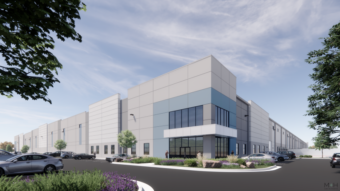Of any sector in commercial real estate, the future of office is arguably the most tenuous. Even as some employees return to the office, many may not—now or potentially ever. Companies and their workers have found value in flexibility of the stay-at-home experiment, choosing to extend it for the foreseeable future in some cases. In other instances, a kind of middle ground is being explored: the use of flex space.
“Companies are scrambling to figure out this new world, figure out how they support their employees’ diverse needs, figure out how to create workplaces not only at a headquarters but also near their teams’ homes, and figure out what to do with their leases that now pose even greater liabilities,” said Anna Levine, chief commercial officer of Industrious, which offers coworking and private office space all over the country. “Ironing out all of this can be overwhelming, especially at a time when companies are knee deep in responding to all of the other changes the pandemic has brought on.”
That’s why so many companies—and even individual employees—are turning to outfits such as Industrious. In some cases, the company just isn’t ready to have everyone back in headquarters, while many employees may also favor the convenience of working from home. It isn’t always a perfect environment, however, as any parent can share. A home office is still at home, which comes with an untold number of distractions
“Demand for coworking space is very much driven by people who need a location to work that isn’t their home,” said Ben Munn, JLL’s global flexible space lead. “We’ve seen demand increasing in near-to-home, suburban locations or dense residential areas and it tends to be for smaller requirements.”
That’s precisely what Regus, which provides coworking and virtual office space, has witnessed in the past few months.
“Currently, we are seeing much greater growth in smaller suburban areas as employees look to cut down on their commute and work closer to home,” a company spokesperson said, touting Regus’ representation in large metropolitan areas, as well as smaller towns and cities. “Our model is very well suited to the changes that are now taking place.”
The uptick comes after a stark drop in interest when the pandemic started. Initially, the coworking industry experienced what Munn describes as a “perfect storm”—reduced demand combined with increased member cancellations. He said that took a toll on many of the companies focused entirely on coworking space.
“This year has been undoubtedly a very difficult period for coworking operators and flex operators in general,” he said.
Those operators had to adapt—and quickly. At Industrious, that meant studying up on COVID-19 to figure out how to overhaul spaces to keep its team and members as safe as possible.
“We teamed up with other leading workplace operators and a roster of experts—epidemiologists, mechanical engineers, behavioral psychologists, etc.—to form the Workplace Operator Readiness Council,” Levine said. “We knew this was no time for competition; it was about coming together as an industry to ensure the safest environments for all of our employees, members and partners.”
The company also heard from folks who were working from home, using that feedback to create a new membership type called Oasis.
“You don’t tend to think of the office as something you can use on Goldilocks terms—just the right amount—but it turns out that tons of people need to escape their homes a couple days a week,” said Levine.
Partnerships also became an important part of moving forward. Industrious worked with landlords to offer tenants options, but it also created new experiences. Partnering with the Wythe Hotel in Brooklyn and Proper Hospitality (which has locations in California and Texas), the company transformed hotel rooms into private offices.
“These have become a great retreat for those struggling with work from home fatigue or needing a quiet space to get heads-down work done without distractions,” Levine said.
As the calendar turns to 2021, those changes, along with advancements in the fight against COVID-19, mean the outlook is much more positive.
“We’re on the precipice of a major change in commercial real estate, and come the spring or summer, as vaccine rates increase, we anticipate most companies in the U.S. making decisions about how to deliver a hub and spoke, hybrid workplace experience to their employees,” said Levine.
JLL’s Munn echoed that, saying he expects employees will have more of a choice where they work in the future.
“Those options could include the home office, the HQ, the downtown office, but also potentially a whole network of coworking spaces that might be near to home,” he said. “We absolutely see that flex will be a bigger part of the way companies provide space in the future. There will be a greater spectrum of choice around what flex means and early in 2021, we’ll see that begin to manifest in demand.”
The early birds, said Levine, are already confirming those plans and will have a leg up once the world starts emerging again.
“The smartest companies are taking this opportunity to rethink their workplace experience strategies,” she said. “We’re already seeing that move towards the outsourced workplace accelerate, and we’re excited about what it means for the months and years to come.”





